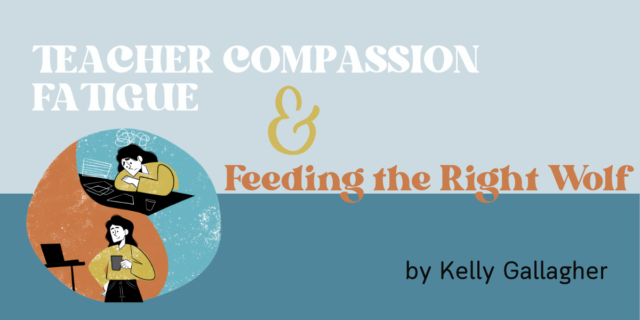
This summer on the podcast we’re going to be taking a break from our normal content. This past year has been draining for everyone, especially teachers, and we wanted to do what we could to help educators take a breather. For the next several weeks we’ll be sharing samples from some of our audiobooks, and we hope that you’re able sit back, relax, and enjoy these read alouds.
Today on the podcast, we have a sample from the audio companion to 180 Days: Two Teachers and the Quest to Engage and Empower Adolescents by Kelly Gallagher and Penny Kittle.
180 Days represents the collaboration of two master teachers—Kelly Gallagher and Penny Kittle—over an entire school year: planning, teaching, and reflecting within their own and each other’s classrooms in California and New Hampshire. Inspired by a teacher’s question, “How do you fit it all in?” they identified and prioritized the daily, essential, belief-based practices that are worth spending time on. They asked, “Who will these students be as readers and writers after a year under our care?”
If you’d like to hear more, you can head over to our new audiobooks feed where you can browse our full catalogue and listen to more samples. Just search for Heinemann Audiobooks wherever you listen to podcasts.
Read along with Kelly and Penny...
The 180 Days project began as an earnest attempt to share the decisions Penny and I make when determining what will fit into a single school year. To move beyond the surface-level responses we had grown accustomed to giving, we decided that the best way to get to the answer was to first plan a year together, and then to teach a year together. The audio companion you’re listening to captures a glimpse of that year. The 180 Days book, however, has evolved into much more than simply sharing what we did. For more on our process, I highly recommend reading the book as well.
At its heart, 180 Day sis about why we did what we did. Creating a classroom conducive to raising engaged readers, writers, listeners, speakers, and thinkers continually led us back to closely examining our decision-making process. And teaching the units we designed meant paying attention throughout the unit to what our students were learning. That led to unforeseen lessons that had to be taught (or retaught). This created tension in our year plan since extending time during one unit constricted time for something else. The bottom line: it didn’t all fit.
Given the demands of the modern-day classroom, we were forced to make critical additions and deletions. We began making these decisions in the summer before we met our students, and we continued to make them as the year unfolded. Often, we found ourselves making decisions while standing in front of a room full of adolescents. In this audio companion, it is our intention to capture some of these decisions and to share our thinking behind them.
Truth be told, both of us are feeling a sense of unease in opening up our classrooms to this level of public scrutiny. This attempt to show why we do what we do—and exposing all that we didn’t get to in a year of teaching, even with our best intentions—is very different from writing a book that simply shares what we would like to do. It feels risky to have to account for sometimes painful decisions. Why does this stay in? Why does this get cut? Why are we teaching it this way? Why did this work? Why did this not work? What should we do next?
We think about this work constantly—our spouses would say obsessively—and we still don’t have all the answers we’re seeking. But we know this: teaching is seductive simply because of its complexity. We want our love of English to be present in the lives of our students this year, and we want our lessons and units to be clearly organized in order to effectively teach well, day in and day out.
- After our initial visits to each other’s classrooms, we were intrigued by our different teaching worlds, and these visits led us to consider some interesting questions:
- In what ways would a ninth-grade year in New Hampshire look the same as a ninth-grade year in California? In what ways would they look different?
- What is common no matter where you teach?
- How will our very different environments shape our decision-making?
- How will the difference in the hours we have to teach students affect our decision-making
- What kind of cross-country collaboration might occur between our students? How might our kids benefit from this collaboration?
We knew it would be easier to continue to do what we have done for years, but after visiting each other’s classrooms, we could see that a collaboration would challenge our thinking and our practices. These questions would push us both to new understandings of teaching and learning.
 Kelly Gallagher (@KellyGToGo) teaches at Magnolia High School in Anaheim, California. He is the author of several books on adolescent literacy, most notably Readicide and Write Like This. Kelly is the former co-director of the South Basin Writing Project at California State University, Long Beach and the former president of the Secondary Reading Group for the International Literacy Association.
Kelly Gallagher (@KellyGToGo) teaches at Magnolia High School in Anaheim, California. He is the author of several books on adolescent literacy, most notably Readicide and Write Like This. Kelly is the former co-director of the South Basin Writing Project at California State University, Long Beach and the former president of the Secondary Reading Group for the International Literacy Association.
Penny Kittle teaches freshman composition at Plymouth State University in New Hampshire. She was a teacher and literacy coach in public schools for 34 years, 21 of those spent at Kennett High School in North Conway. She is the co-author of 180 Days with Kelly Gallagher, and is the author of Book Love, and Write Beside Them, which won the James Britton award. She also co-authored two books with her mentor, Don Graves, and co-edited (with Tom Newkirk) a collection of Graves’ work, Children Want to Write. She is the president of the Book Love Foundation and was given the Exemplary Leader Award from NCTE’s Conference on English Leadership. In the summer Penny teaches graduate students at the University of New Hampshire Literacy Institutes.
Learn more about Penny Kittle on her websites, pennykittle.net and booklovefoundation.org, or follow her on twitter


